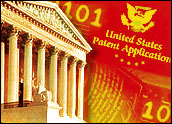
The lengthy patent battle between e-commerce giant eBay and a small firm that says it came up with the popular “Buy it Now” technology first will get a hearing before the U.S. Supreme Court Wednesday.
The focus of the hearing will be whether MercExchange should be granted an injunction barring eBay from using its “Buy it Now” feature, which lets buyers short-circuit the auction process by agreeing to pay the seller’s asking price before an auction ends.
High Stakes
MercExchange won a jury trial in 2003 in which eBay was found to have infringed on some of the firm’s patents. eBay later scored a victory by having the award reduced from US$34 million to $25 million. The case has continued to move through the courts because the judge overseeing the original case refused to issue an injunction against the auction site.
The U.S. Court of Appeals for the Federal Circuit reversed that decision, clearing the way for an injunction before eBay appealed to the high court.
The stakes could be high, with eBay saying that 34 percent of its fourth quarter gross merchandise value of $12 billion came from fixed-price or buy it now sales.
Experts say the case is also being closely watched by many companies in technology and industries seeking clarity on the issue of what role injunctions should play in patent enforcement.
That issue was at the heart of the lengthy and now settled battle between Research In Motion and NTP and has wide-reaching implications for other businesses as well, including the pharmaceutical industry.
Buy it Later
eBay has recognized the risks the open lawsuit brings, saying in its most recent 10-K filing with the Securities and Exchange Commission (SEC) that it began to alter the “Buy it Now” feature immediately after the 2003 verdict to reduce or eliminate potential infringement.
“We believe that any injunction that might be issued by the district court will not have any impact on our business,” eBay said in the filing.
MercExchange founder Thomas Woolston has said publicly that he would seek more than $100 million in damages from eBay in order to settle the case, including the originally awarded $25 million as well as additional damages to cover the period after the trial through today.
Even if it is forced to settle at a high price, eBay should be able to handle the payout without a major hit for shareholders. The company reported just shy of $3 billion in cash on hand at the end of the last quarter.
eBay shares have not yet seen any “overhang” from the case, Piper Jaffray analyst Safa Raschty said. She added that only a major setback would likely change that. eBay shares were moving higher in late trading Tuesday, up more than 4 percent to $38.69.
While a settlement is a possibility, David A. Roodman, a partner and co-chair of the Intellectual Property Group at the international law firm Bryan Cave LLP, told the E-Commerce Times that in cases where each side digs in its heels, the obvious solution of a settlement can be difficult to achieve.
“Often, you end up with parties further apart than when they began talking,” he said.
Friends and Enemies
Depending upon whose viewpoint it’s being considered from, the case is either a classic David vs. Goliath battle or something else, with some denigrating MercExchange as a “patent troll” whose only mission is to prosecute its patents. In its defense, the firm notes that it now has an active auction site of its own and has licensed its technology to uBid.
Also, while MercExchange and eBay are the main combatants in the case, they each have formidable allies on their side. eBay enjoys the support of much of the tech industry, with the Business Software Alliance (BSA) — which Microsoft took the lead in creating in 1988 — among those filing briefs on its behalf.
That group and others say injunctions are not necessary and that the threat of large monetary payouts is enough to keep most companies from infringing on existing patents.
Injunctions have been viewed as the primary enforcement tool in civil patent cases since the Supreme Court backed their use in 1908. Experts note that much has changed since then, including the sheer volume of patents being issued and the cost of defending or prosecuting suits.
Joining the argument in favor of injunctions are many major drug makers, who say the tool is necessary in some cases to force compliance. Speed is often an issue in drug patent cases, since the lifespan of the patents granted on drugs is limited, with competitors able to introduce generic versions after a period of time — seven years in many cases.
Some observers say eBay is already preparing for what could be a legislative battle to reform the patent system, recently hiring a lobbyist from the Washington, D.C. firm founded by former Attorney General John Ashcroft.
Some support may be building for revamping some areas of patent law, with many viewing the high-profile battles such as the RIM-NTP case as a costly distraction.
























































Social Media
See all Social Media